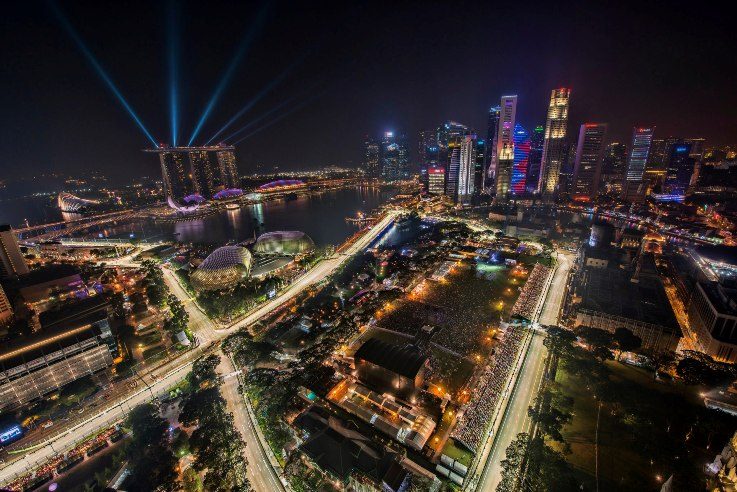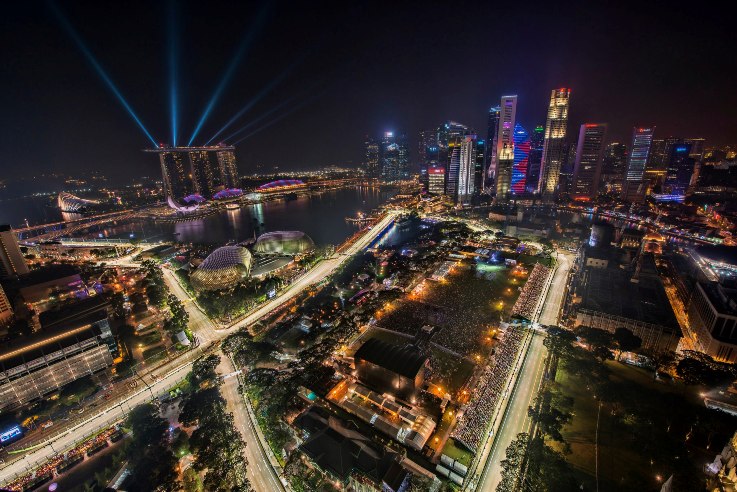Formula One is about serious speed, cutting-edge engineering and transformative technology. But mostly it’s about money. Like no other sport, Formula One (F1) follows the money. That’s why the F1 merry-go-round stops in Singapore this weekend.
Only in its seventh running, the Singapore Grand Prix has already become iconic. It is the only night race on the F1 calendar. Set against a glittering cityscape, the Marina Bay Street Circuit – incorporating a pair of bridges and an underpass – provides both exciting racing and stunning television images. And although the F1 caravan will have packed up and moved on just hours after Sunday evening’s race, Singapore’s rapid emergence as a Grand Prix venue to rival Monaco’s status as the ‘jewel in F1’s crown’ points to more permanent changes in where global economic power resides.
According to a recent McKinsey publication, the decade from 2000-2010 witnessed the fastest-ever change in the world’s economic centre of gravity. Economic influence is tracking from Europe to Asia, we are constantly told. Yet absorbing and interpreting these trends and statistics, and especially what they portend for the future, is difficult. Far easier to digest is the F1 calendar, which functions like a one-page global balance sheet, providing an annual snapshot of who is flexing economic muscle.
Examining changes to the F1 calendar over time provides tangible insight into understanding contemporary global power dynamics. In 1998, the year before Malaysia hosted its first F1 race, eleven of F1’s sixteen races (70%) were held in Europe, the sport’s traditional heartland. The Americas (Brazil, Argentina and Canada) hosted three races, with two long-standing appointments in Asia rounding out the calendar (Australia and Japan). By 2013, only fifteen years later, Europe’s share of races had dwindled to less than 40% (seven of nineteen), despite the addition of three extra races to the schedule. Australia, Malaysia, China, Singapore, Japan, India and South Korea all hosted Grands Prix during 2013, meaning Asia was home to as many races as Europe.
Analysing F1’s calendar a little more closely reveals more than just the recent economic ascendency of Asia. Western governments, including Australia’s, are becoming increasingly reluctant to commit public funds to hosting big global events. Their publics are increasingly agitated by the inevitable inconveniences these events bring, while corporate donors chafe at associating their brand with such ‘expensive toys’ at a time of fiscal constraint. Each and every year, the pressure grows to demonstrate exactly how much the race injects into the local economy. The viability and impact of such events is determined according to ever-shorted time horizons. Returns on investment must be observed immediately. The bottom line is interpreted in purely financial terms.
Governments of emerging states view the prospect of hosting a Grand Prix much differently. For them, the cost-benefit calculus is less constrained. Demonstrating short term returns is less of a concern. They focus on the future and ponder the potential upside. They conceive of a Grand Prix as part of a something bigger. More than a stand-alone event, they provide an opportunity to project to the world how they want to be seen.
Malaysia, for instance, used its Grand Prix as a symbol of a broader modernising project. The resources and expertise of the wholly government-owned oil and gas company, Petronas, have been central to a strategy of introducing modern Malaysia to the world. Petronas has been the title-sponsor of the Malaysian Grand Prix since its inception in 1999 and lends its name to the other grand symbol of modern, vibrant Malaysia; Kuala Lumpur’s Petronas Towers. Petronas is also the lead sponsor of the Mercedes F1 team, this year’s championship leaders and a co-sponsor of the Chinese Grand Prix. The team’s silver cars streak around the world’s circuits flashing the aqua Petronas logo.
For Singapore, too, hosting a Grand Prix is a powerful symbol, reinforcing our associations of the city-state as a global transport, shopping and technology hub where East and West can meet, especially to do business. Like in Malaysia, the Government has partnered with leading national brands – Sing Tel for the first six years, and now Singapore Airlines – to collaboratively promote the Grand Prix, their own products and YourSingapore.
Of course, there is significant risk in hosting a Grand Prix. Obtaining a licence to stage a race is exceedingly expensive and doesn’t give the host television rights, meaning all profits must come from ticket sales. Bernie Ecclestone – F1’s commercial supremo – is an exacting paymaster, as India, South Korea and Turkey can attest; each had their races cut from this year’s calendar. But the very fact that these states sought, and were awarded, the rights to host Grands Prix in recent times is itself instructive, as is the list of states lining up to take their place. This year, Russia joins the circuit for the first time. And it has just been announced that Mexico will feature next year, in an expanded 20-race season. Ascendant states are jostling for their place in the diary.
In a contemporary expression of the developmental state, their Governments are competing with each other to leverage the opportunity F1 affords them to demonstrate their state belongs in the top tier. In doing so, they display a boldness many Government’s in the West appear to lack. The changes in the F1 calendar, therefore, also reveal something more problematic for the West than their loss of relative economic clout; an apparent discomfort to actively embrace, wield and cultivate soft power. Joseph Nye, who popularised the term, defines ‘soft power’ as “the ability to affect others through the co-optive means of framing the agenda, persuading, and eliciting positive attraction in order to obtain preferred outcomes.”
Formula One, the most-watched global sport outside the Olympics and the football World Cup, represents a prime opportunity for emerging states to project themselves as global players. (It’s no coincidence that the states clamouring for a place on the F1 calendar have also recently sought to host the Olympics and the football World Cup). Singapore, already so adept at projecting itself effectively on the world stage, has packaged its Grand Prix to reinforce its key selling points. The ability to frame the agenda is more valuable to Singapore than the pure monetary value the influx of visitors and race receipts bring this weekend.
The constrained fiscal circumstances in the West are a hand-brake to investing in soft power. More worryingly, these conditions have prompted some to suggest it’s prudent to retreat from international engagement. But globalisation means you can’t afford to take a pit stop. In today’s increasingly competitive world, the ability of states to actively and effectively position themselves in the global marketplace is becoming ever more important.
F1 is just one way to participate in this contest, of course. However, as Singapore and Malaysia have demonstrated, it can certainly be an effective one. Enjoy the race.
Benjamin Day (@benjaminsday) is a PhD candidate in the Australian National University’s School of International, Political & Strategic Studies, where he researches foreign policy decisionmaking. Image by chensiyuan.
 Facebook
Facebook  Twitter
Twitter  Soundcloud
Soundcloud  Youtube
Youtube  Rss
Rss 
